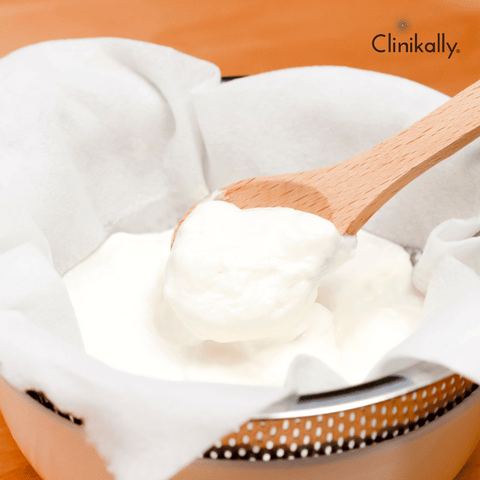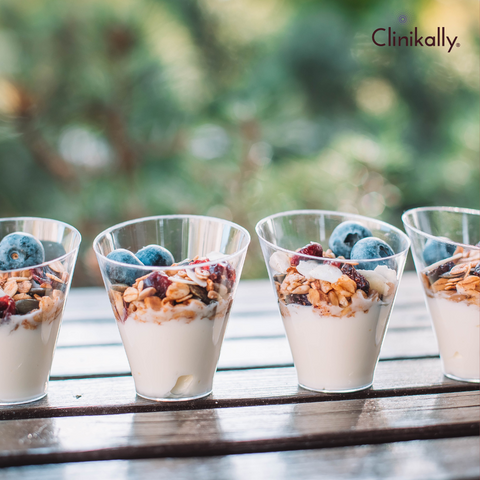Choosing the appropriate yoghurt can bring several health benefits because it is high in protein, calcium, and healthy microorganisms. Consider the following aspects to make a nutritious choice: Yoghurt Types, Examine the label, the fat content, the added ingredients, and the flavorings, as well as your personal preferences and dietary needs. Remember that yoghurt is a flexible ingredient that may be eaten on its own, in smoothies, as a topping for oats or fruit, or as the foundation for sauces and dips. Incorporating yoghurt into your diet will help you maintain a well-balanced and nutritious diet.
Understanding Yoghurt Nutrition: A Guide to Making the Right Choice

Understanding yoghurt nutrition is critical for making informed decisions that are in line with your health objectives. Here's a guide to navigating yoghurt labels and selecting the best options for your needs:
-
Serving Size
-
Calories and Macronutrients
-
Added Sugars
-
Probiotics and Live Cultures
-
Calcium and Other Nutrients
-
Allergies and Dietary Restrictions
-
Quality and Ingredients
Remember that yoghurt is a versatile food that can be eaten on its own, in recipes, or as a component of a variety of dishes. Consider your personal preferences, dietary needs, and health goals when selecting yoghurt options that suit your lifestyle.
Exploring Different Types of Yoghurt: From Greek to Dairy-Free Options
Yoghurt comes in a variety of flavors, each with its own set of characteristics and benefits. You can take dermatologists recommended supplements for better result. Here's a look at some different types of yoghurt, including Greek yoghurt and dairy-free alternatives:
-
Greek Yogurt:
-
The thick and creamy texture of Greek yoghurt is well known. It is made by straining regular yoghurt to remove the whey, resulting in a lower moisture content.
-
Greek yoghurt is higher in protein and lower in carbohydrates than regular yoghurt. It can be a satisfying option for those looking for more protein or a creamier texture in their diet.
-
Use Greek yoghurt on its own, as a base for smoothies or parfaits, or as a healthier substitute for sour cream in recipes.
-
Regular Yogurt:
-
Yoghurt is created by fermenting milk with live cultures.
-
Regular yoghurt is an excellent source of protein, calcium, and probiotics. It comes in a variety of flavours and textures, as well as low-fat and full-fat versions.
-
Regular yoghurt can be eaten on its own, as a base for homemade dressings, blended into smoothies, or baked into baked goods.
-
Dairy-Free Yogurt Alternatives:
-
Soy yoghurt is a popular dairy-free option made from soy milk. It has a similar taste and texture to dairy-based yoghurt and is high in plant-based protein.
-
Almond milk is used to make yoghurt, which is popular for its nutty flavour. It is typically lower in protein but can be a good option for those who avoid dairy and soy.
-
Coconut Milk Yoghurt has a creamy, tropical flavour. It is frequently higher in saturated fats, but some brands offer low-fat options. It is a good option for those who like the flavour of coconut.
-
The market for dairy-free yoghurt recently welcomed oat milk yoghurt. It is made from oats and is safe for people who are allergic to nuts or soy. Yoghurt made from oat milk typically has a creamy texture and a mild flavour.
The Power of Probiotic Yoghurt: Enhancing Gut Health and Digestion
In fact, probiotic yoghurt can significantly improve digestion and gut health because it contains live, active cultures of beneficial bacteria. These probiotics, also referred to as beneficial bacteria, have several advantages for the digestive system. Here is a closer look at the probiotic yogurt's power:
-
Promotes a Healthy Gut Microbiota
-
Supports Digestive Health
-
Enhances Immune Function
-
Alleviates Lactose Intolerance Symptoms
-
Choosing the Right Probiotic Yogurt
Individual responses to probiotics may differ, and the advantages of probiotic yoghurt are based on factors such as the type and amount of probiotics ingested, the individual's gut health, and the specific health condition. If you have specific health concerns or digestive issues, it is always advisable to seek personalized advice from a healthcare practitioner. Incorporating probiotic yoghurt into your diet can help you maintain a healthy gut and support good digestion.
Yoghurt and Calcium: Promoting Strong Bones and Teeth
Calcium, a mineral necessary for maintaining healthy bones and teeth, is present in yoghurt in good amounts. Yoghurt can help you get the daily recommended amount of calcium if you eat it as part of a healthy, balanced diet. Here's how yoghurt helps to strengthen bones and teeth:
-
Calcium Content:
-
Yoghurt contains calcium naturally derived from the milk it is made from. The calcium content of yoghurt and milk may differ depending on the type of yoghurt and milk used.
-
Calcium is an essential nutrient that is essential for bone formation, maintenance, and remodeling.
-
Bone Health Benefits:
-
Adequate calcium intake, along with other bone-building nutrients like vitamin D and magnesium, contributes to long-term bone health.
-
Consuming calcium-rich foods, such as yoghurt, can help build strong bones and teeth, especially during childhood and adolescence, when bone growth is rapid.
-
Yoghurt can also help to maintain bone density and lower the risk of osteoporosis and fractures later in life.
-
Calcium Absorption:
-
Because of the presence of lactose, a natural sugar found in milk, the calcium in yoghurt is generally well absorbed by the body. Lactose facilitates calcium absorption.
-
Some people who have trouble digesting lactose may find that yoghurt is more tolerable than other dairy products. Those who are lactose intolerant should consider lactose-free yoghurt or yoghurt made from alternative milk sources.
-
Vitamin D Synergy:
-
Calcium absorption and utilization in the body are both dependent on vitamin D. Some yoghurts contain vitamin D, which helps boost the calcium benefits.
-
The body can also produce vitamin D naturally when exposed to sunlight. Yoghurt fortified with vitamin D and sunlight exposure can help bones even more.
-
Choosing Yoghurt for Calcium:
-
Look for yogurts that list a sizable portion of the daily recommended calcium intake on the label. Generally speaking, whole milk yoghurts may contain more calcium than low-fat or fat-free varieties.
Yoghurt for Wellness: Exploring the Health Benefits and Beyond

Beyond just being nutrient-dense, yoghurt has a number of health advantages. Here are some potential health advantages and other advantages of including yoghurt in your diet:
-
Digestive Health
-
Immune Function
-
Nutrient Density
-
Weight Management
-
Convenient and Versatile
-
Mood and Mental Well-being
It is critical to select yoghurt options that are compatible with your dietary preferences, nutritional requirements, and health objectives. Consider plain yoghurt with your own natural sweeteners or flavorings instead of flavored yoghurt with added sugars. Yoghurt, as part of a well-rounded, balanced diet, can provide several health advantages, promote overall wellness, and provide culinary diversity. Always get personalized advice from a healthcare practitioner or trained dietitian regarding your individual health needs and nutritional considerations.
Managing Weight with Yoghurt: How It Can Support Your Healthy Lifestyle
Yogurt's nutrient content, satiety-inducing qualities, and versatility make it a useful addition to a weight-management strategy. Here are some ways yoghurt can help you achieve your healthy lifestyle and weight loss goals:
-
Protein Content:
-
Yoghurt is high in protein, which is important for promoting satiety and maintaining lean muscle mass.
-
Including protein-rich foods in your meals and snacks, such as yoghurt, can help curb hunger, reduce cravings, and keep you feeling fuller for longer. This can help with portion control and keep you from overeating.
-
Satiety and Portion Control:
-
Yogurt's combination of protein, fat, and carbohydrates contributes to its ability to provide a feeling of fullness.
-
Consuming yoghurt as a snack or incorporating it into meals can help control hunger and prevent overeating on less nutritious foods.
-
Choosing yoghurt with a balanced macronutrient profile, such as Greek yoghurt or yoghurt with added nuts or seeds, can boost satiety even more.
-
Nutrient Density:
-
Yoghurt contains a variety of essential nutrients, including protein, calcium, vitamins, and minerals, and is typically low in calories.
-
Choosing nutrient-dense foods like yoghurt benefits your overall health and well-being while also meeting your nutritional needs without consuming too many calories.
-
Versatility and Healthy Swaps:
-
Yoghurt is a versatile ingredient that can be used in a variety of recipes and meal options. It can be used as a base for smoothies, a topping for fruits or whole grains, a substitute for high-calorie dressings or spreads, or an ingredient in baked goods.
-
You can make healthier swaps that reduce calorie intake while adding flavour and nutrition by incorporating yoghurt into your recipes and meals.
-
Mindful Snacking:
-
Yoghurt is a healthy and convenient snack option. It is easy to portion and pack for on-the-go consumption, lowering the likelihood of reaching for less healthy snacks when hunger strikes.
-
When yoghurt is combined with other nutrient-dense foods such as fruits, nuts, or whole grain cereals, it provides more fibre, vitamins, and minerals, making it a more satisfying and balanced snack option.
Boosting Immunity with Yoghurt: Strengthening Your Body's Defense System
Yoghurt can be a part of a healthy diet and lifestyle that support the immune system, even though it cannot guarantee immunity. Yoghurt has nutrients and healthy bacteria that may help your body's defences function better. Here are some methods that yoghurt can strengthen your immune system:
-
Probiotics
-
Gut Health and Immunity
-
Vitamin D Fortification
-
Nutrient Support
-
Antioxidants
It is important to note that each person may react differently to yoghurt and experience different effects on their immunity. Additionally, factors like lifestyle choices, stress levels, sleep patterns, and genetic predisposition have an impact on immune health. If you have specific health concerns or questions about your immune system, you should speak with a healthcare professional to get personalized advice.
Yoghurt and Heart Health: Understanding the Link and Making Heart-Smart Choices
Yogurt can be a heart-healthy food choice when consumed as part of a balanced diet and healthy lifestyle. Here's how yogurt can contribute to heart health and some tips for making heart-smart choices:
-
Nutrient Profile:
-
Yoghurt is high in protein, which is essential for muscular health and satiety. Protein-rich foods can help manage weight and improve overall cardiovascular well-being, making them excellent for heart health.
-
Yoghurt contains calcium, which is necessary for strong bones and teeth. While the direct impact of calcium on heart health is still being studied, it is a vitamin that contributes to overall well-being.
-
Some yoghurts may contain potassium and magnesium, minerals linked to blood pressure control and heart health.
-
Probiotics and Gut Health:
-
Yoghurt contains probiotics, which are live and active cultures of beneficial bacteria that support healthy gut microbiota.
-
According to new research, maintaining a balanced gut microbiota may benefit heart health by reducing inflammation and improving lipid profiles.
-
Lower Sodium Options:
-
High sodium consumption is linked to elevated blood pressure, which is a risk factor for heart disease. Choose low-sodium or unsalted yoghurt to help keep your overall sodium intake under control.
-
Added Sugars:
-
Some flavored yoghurts may contain added sugars, which can lead to weight gain and an increased risk of heart disease.
-
Choose plain or unsweetened yoghurt and add your own natural sweeteners like fresh fruits or a drizzle of honey to control the sugar content.
-
Fat Content:
-
Full-fat yoghurt contains more saturated fat, which can increase the risk of heart disease if consumed in excess. If you choose full-fat yoghurt, keep portion sizes in mind and combine it with other low-fat foods in your diet.
-
Low-fat or fat-free yoghurt is lower in calories and saturated fat. These are good options for people who want to lose weight or cut back on saturated fat.
-
Overall Diet and Lifestyle:
-
Yoghurt is only one part of a heart-healthy diet. Include yoghurt in a healthy eating plan that includes a variety of fruits, vegetables, whole grains, lean proteins, and healthy fats to promote heart health.
-
Regular physical activity, a healthy weight, stress management, quitting smoking, and limiting alcohol consumption are all important for heart health.
Yoghurt for Radiant Health: Enhancing Your Skin, Muscles, and More

Yoghurt has the ability to improve overall health through improving skin health, muscle function, and other factors. While yoghurt does not give all-encompassing health advantages on its own, including it within a well-balanced diet and lifestyle can help you achieve radiant health. Skin health, muscle function, bone health, nutrient density, digestive health, and culinary flexibility are just a few of the ways yoghurt can help you. It's crucial to remember that everyone's reaction to yoghurt and how it affects different elements of health is different. Other elements that contribute to radiant health include general nutrition, lifestyle, genetics, and personal health issues. For optimal overall well-being, incorporate yoghurt as part of a well-balanced diet that includes a range of nutrient-rich foods, frequent physical activity, appropriate sleep, stress management, and good hygiene practices. If you have specific health problems or questions, speaking with a healthcare practitioner or a certified dietitian can provide tailored advice.
Nourishing Your Skin: The Beauty Benefits of Yoghurt for a Healthy Glow
Yoghurt can help your skin look healthy and radiant by providing beauty benefits. The nutrients and properties found in yoghurt can be beneficial when used both internally and externally. Here are some ways yoghurt can help your skin:
-
Moisturization and Hydration:
-
Natural Moisturiser: The lactic acid in yoghurt acts as a natural moisturiser, hydrating and softening the skin.
-
Locking in Moisture: Yogurt's protein and fat content can help lock in moisture, preventing dryness and promoting a healthy skin barrier.
-
Exfoliation and Brightening:
-
Lactic Acid: Lactic acid in yoghurt can gently exfoliate the skin, removing dead skin cells and promoting a smoother, more radiant complexion.
-
Skin Tone and Texture: Using yoghurt as a face mask or cleanser on a regular basis may help improve skin tone, reduce the appearance of blemishes, and improve overall texture.
-
Soothing and Calming Properties:
-
Effects on Inflammation: Yogurt's anti-inflammatory properties may help soothe irritated or inflamed skin. Those with sensitive or acne-prone skin may find this to be especially helpful.
-
Cooling Effect: After sun exposure, applying chilled yoghurt to the skin can give you a soothing and revitalizing feeling.
-
Brightening and Lightening Effects:
-
Natural Bleaching Agent: Yoghurt has some mild bleaching properties that could eventually help fade hyperpigmentation, dark spots, and other skin imperfections. Results, however, could differ based on a person's unique skin characteristics.
-
Antioxidant Protection:
-
Antioxidants: Antioxidants found in yoghurt, like vitamins C and E, can help shield the skin from free radicals and oxidative stress. This may help to give skin an appearance of youth and health.
-
External Use:
-
DIY Face Masks: For a base ingredient, yoghurt can be combined with other organic ingredients like honey, turmeric, lemon juice, or oatmeal to provide additional benefits.
-
Gentle Cleanser: You can nourish and moisturize the skin while removing impurities by using plain yoghurt as a cleanser or combining it with a mild exfoliant.
Yoghurt for Muscle Recovery: Supporting Your Fitness Journey and Exercise Regimen
Yoghurt can be an excellent addition to your post-workout regimen, aiding in muscle healing and enhancing your entire fitness journey. Protein content, branched-chain amino acids (BCAAS), nutritional timing, calcium and vitamin D, gut health and nutrient absorption, versatility, and matching with other nutrient-rich foods are all ways yoghurt can help. Keep in mind that yoghurt is only one part of a well-rounded post-workout nutrition routine. To support your fitness goals, you should eat a well-balanced diet that includes a variety of protein sources, carbs, healthy fats, and other critical elements. Individual protein requirements and dietary preferences may differ. Consult a healthcare practitioner or a qualified dietitian to discover the best protein intake and personalized nutrition plan for your unique fitness journey and workout program.
Managing Diabetes with Yoghurt: Maintaining Blood Sugar Levels and Insulin Sensitivity
Yoghurt can be part of a well-balanced diet for people with diabetes since it helps to maintain blood sugar levels and improve insulin sensitivity. Here's how yoghurt can help you manage your diabetes:
-
Protein Content:
-
Protein from yoghurt can aid in slowing the digestion and absorption of carbohydrates from other foods that are eaten with it. Yoghurt is a good source of protein.
-
Yoghurt is a good source of protein that you can include in your meals to avoid sharp blood sugar spikes after eating.
-
Low Glycemic Index:
-
The glycemic index (GI) gauges how quickly a food's carbohydrates raise blood sugar levels in a person. Since yoghurt typically has a low glycemic index, its effect on blood sugar levels is negligible.
-
Yoghurt is a low-GI food that you can choose to help control your blood sugar levels.
-
Calcium and Vitamin D:
-
Yoghurt is a good source of calcium, which is important for bone health. Some yoghurts are also fortified with vitamin D.
-
Adequate vitamin D levels have been linked to improved insulin sensitivity, and calcium has been shown to improve insulin release and glucose metabolism.
-
Probiotics and Gut Health:
-
Yogurt's probiotics can help maintain a healthy gut microbiota, which may aid with blood sugar management and insulin sensitivity.
-
Some research suggests that a healthy gut microbiota, influenced by probiotics, may aid in the regulation of glucose metabolism and the reduction of insulin resistance.
-
Portion Control and Added Sugars:
-
When choosing yoghurt, keep added sugars in mind, as they can contribute to high blood sugar levels.
-
Choose plain or unsweetened yoghurt and, if desired, add natural sweeteners such as fresh fruits or a small amount of honey. This allows for better control of added sugars and carbohydrate intake overall.
-
Individualized Approach:
-
Diabetes management is highly individualized, and it is critical to consider your specific dietary requirements, blood sugar targets, and medications.
-
Work with a healthcare professional or registered dietitian to create a personalized meal plan that includes yoghurt and is in line with your specific health goals and blood sugar control.
Yoghurt Delights: Creative Recipes and Delicious Yoghurt-Based Creations

Yoghurt is a versatile ingredient that can be used in a wide range of inventive recipes and delectable yogurt-based creations. Here are some ideas to get you started:
-
Yoghurt Parfait:
-
In a glass or jar, layer yoghurt, fresh fruits, granola, and nuts for a nutritious and visually appealing breakfast or snack.
-
To add flavor, experiment with different fruit combinations, seeds, and drizzles of honey or nut butter.
-
Smoothie Bowls:
-
Blend yoghurt with your favorite fruits, such as berries, bananas, or mangoes, and a liquid of your choice (such as milk or juice), to make a thick and creamy smoothie.
-
Pour the smoothie into a bowl and top with granola, sliced fruits, chia seeds, coconut flakes, or nuts for extra texture and nutrition.
-
Frozen Yoghurt Popsicles:
-
Combine yoghurt with pureed fruits, such as strawberries or peaches, and your preferred sweetener (such as honey or maple syrup).
-
Fill popsicle molds halfway with the mixture, insert sticks, and freeze until firm. Enjoy a healthier and more refreshing alternative to store-bought popsicles.
-
Yoghurt Dips and Dressings:
-
Create a creamy yogurt dip by mixing yogurt with herbs, spices, and garlic. Use it as a dip for vegetables, pita bread, or baked chips.
-
To make a tangy and refreshing salad dressing, combine yoghurt, lemon juice, olive oil, and herbs.
-
Yoghurt Marinades:
-
Marinate chicken, fish, or tofu in yoghurt, herbs, spices, and lemon juice for tender, flavorful results.
-
Yogurt's acidity and probiotics can help tenderize the meat and improve its overall flavour.
-
Yoghurt Desserts:
-
Combine yoghurt with a variety of fresh fruits, such as berries, oranges, and melons, to make a yogurt-based fruit salad.
-
To add a creamy and tangy twist to desserts like pancakes, waffles, or warm fruit crumbles, use yoghurt as a topping.
-
Yogurt-Based Baked Goods:
-
For a moist and healthier version, replace some or all of the butter or oil in muffin or cake recipes with yoghurt.
-
Yoghurt can add moisture and tenderness to baked goods while reducing the need for additional fats.
Yoghurt Snack Ideas: Healthy and Flavorful Options for On-the-Go Delights
Yoghurt is an excellent choice for healthy and flavorful on-the-go snacks. Yoghurt parfait cups, yoghurt and fruit smoothies, yoghurt fruits, frozen yoghurt bites, yoghurt and veggie dip, yoghurt with nuts, and yoghurt protein balls are a few delicious and healthy yoghurt snack ideas. Always choose varieties of yoghurt that are appropriate for your dietary preferences and nutrient needs, such as Greek yoghurt, nonfat, low-fat, or dairy-free options. Additionally, you should consider portion sizes and additional sweeteners based on your personal preferences and health objectives. These yoghurt snack ideas are delicious, portable, and nutrient-dense options for on-the-go treats.
Yoghurt Smoothie Recipes: Refreshing and Nutrient-Packed Blends for Every Taste
Here are some recipes for hydrating, nutrient-rich yoghurt smoothies that suit various palates:
-
Berry Blast:
-
Ingredients:
-
1 cup frozen mixed berries (strawberries, blueberries, and raspberries)
-
1/2 cup plain Greek yoghurt
-
1/2 cup almond milk (or your preferred milk)
-
1 tablespoon honey or maple syrup (optional for added sweetness)
-
1/2 teaspoon vanilla extract (optional)
-
Instructions:
-
Blend all the ingredients until smooth and creamy. Adjust the consistency by adding more milk if needed. Serve chilled.
-
Tropical Paradise:
-
Ingredients:
-
1/2 cup pineapple chunks
-
1/2 cup mango chunks
-
1/2 banana
-
1/2 cup plain or vanilla yoghurt
-
1/2 cup coconut water or coconut milk
-
1 tablespoon shredded coconut (optional)
-
Instructions:
-
Blend all the ingredients until well combined. Add more coconut water or milk for desired consistency. Garnish with shredded coconut if desired, and enjoy the tropical flavors.
-
Green Powerhouse:
-
Ingredients:
-
1 cup fresh spinach
-
1/2 ripe avocado
-
1/2 cup sliced cucumber
-
1/2 cup pineapple chunks
-
1/2 cup plain or Greek yoghurt
-
Juice of 1/2 lime
-
A handful of fresh mint leaves (optional for added freshness)
-
Instructions:
-
Blend all the ingredients until smooth and creamy. Adjust the consistency by adding more yoghurt or a splash of water. Squeeze lime juice to taste and add fresh mint leaves for a refreshing twist.
-
Peanut Butter Banana:
-
Ingredients:
-
1 ripe banana
-
2 tablespoons peanut butter
-
1/2 cup plain or vanilla yoghurt
-
1/2 cup milk of your choice
-
1 tablespoon honey or maple syrup (optional for added sweetness)
-
A pinch of cinnamon (optional)
-
Instructions:
-
Blend all the ingredients until well combined. Adjust the consistency by adding more milk if desired. Sprinkle with cinnamon for an extra flavor boost.
-
Chocolate-Berry Delight:
-
Ingredients:
-
1 cup frozen mixed berries (strawberries, raspberries, blueberries)
-
1/2 cup plain or vanilla yogurt
-
1 cup milk of your choice
-
1 tablespoon cocoa powder
-
1 tablespoon honey or maple syrup (optional for added sweetness)
-
A handful of ice cubes
-
Instructions:
-
Blend all the ingredients until smooth and creamy. Adjust the sweetness by adding more honey or maple syrup, if desired. Add ice cubes and blend again for a chilled and refreshing treat.
Yoghurt in Cooking: Exploring Savory and Sweet Dishes with Yoghurt as an Ingredient

Yoghurt can add creaminess, tanginess, and a healthy twist to both savory and sweet dishes. It is also a versatile and delectable ingredient. The following are some suggestions for using yoghurt in your cooking:
Savory Dishes:
- Creamy Salad Dressings and Dips
- Marinades for Meat and Poultry
- Creamy Soups and Sauces
- Tzatziki
- Yogurt-based Marinara Sauce
Sweet Dishes:
- Smoothies and Breakfast Bowls
- Frozen Yoghurt
- Yoghurt Parfaits and Fruit Salads
- Yoghurt Cakes and Baked Goods
- Yoghurt Popsicles
Keep in mind to modify the quantity of yoghurt and other ingredients to suit your preferences for flavour and dietary requirements. Discover your favourite yoghurt-based dishes by experimenting with various flavours and combinations.
































